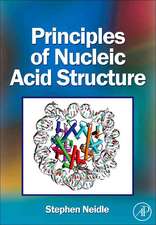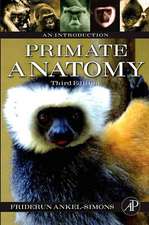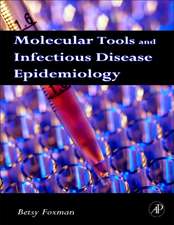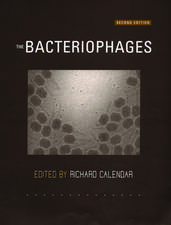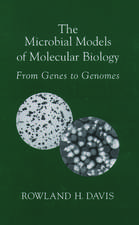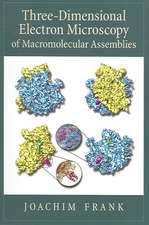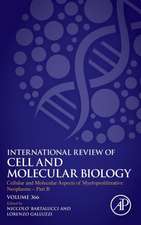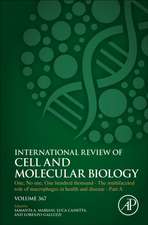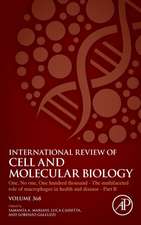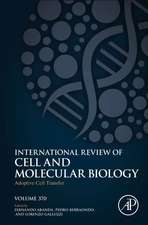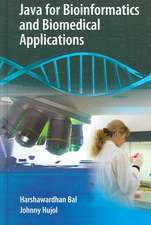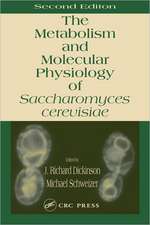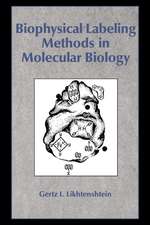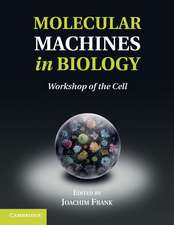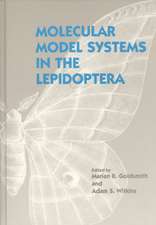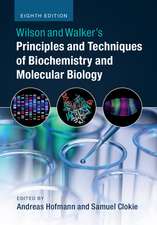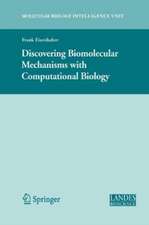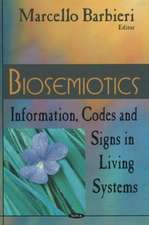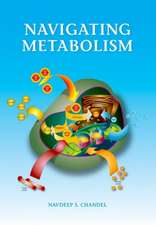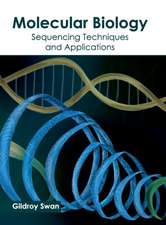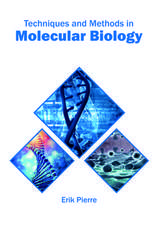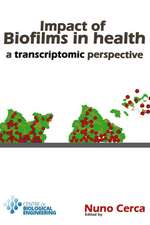Data Mining Techniques for the Life Sciences: Methods in Molecular Biology, cartea 609
Editat de Oliviero Carugo, Frank Eisenhaberen Limba Engleză Hardback – 14 dec 2009
| Toate formatele și edițiile | Preț | Express |
|---|---|---|
| Paperback (3) | 722.53 lei 43-57 zile | |
| Springer – 21 apr 2018 | 722.53 lei 43-57 zile | |
| Springer Us – 6 mai 2023 | 826.48 lei 43-57 zile | |
| Humana Press Inc. – 23 aug 2016 | 935.67 lei 43-57 zile | |
| Hardback (3) | 664.44 lei 43-57 zile | |
| Humana Press Inc. – 14 dec 2009 | 664.44 lei 43-57 zile | |
| Springer – 27 apr 2016 | 1015.20 lei 43-57 zile | |
| Springer Us – 5 mai 2022 | 1289.75 lei 43-57 zile |
Din seria Methods in Molecular Biology
- 9%
 Preț: 791.59 lei
Preț: 791.59 lei - 23%
 Preț: 598.56 lei
Preț: 598.56 lei - 20%
 Preț: 882.95 lei
Preț: 882.95 lei -
 Preț: 252.04 lei
Preț: 252.04 lei - 5%
 Preț: 802.69 lei
Preț: 802.69 lei - 5%
 Preț: 729.61 lei
Preț: 729.61 lei - 5%
 Preț: 731.43 lei
Preț: 731.43 lei - 5%
 Preț: 741.30 lei
Preț: 741.30 lei - 5%
 Preț: 747.16 lei
Preț: 747.16 lei - 15%
 Preț: 663.45 lei
Preț: 663.45 lei - 18%
 Preț: 1025.34 lei
Preț: 1025.34 lei - 5%
 Preț: 734.57 lei
Preț: 734.57 lei - 18%
 Preț: 914.20 lei
Preț: 914.20 lei - 15%
 Preț: 664.61 lei
Preț: 664.61 lei - 15%
 Preț: 654.12 lei
Preț: 654.12 lei - 18%
 Preț: 1414.74 lei
Preț: 1414.74 lei - 5%
 Preț: 742.60 lei
Preț: 742.60 lei - 20%
 Preț: 821.63 lei
Preț: 821.63 lei - 18%
 Preț: 972.30 lei
Preț: 972.30 lei - 15%
 Preț: 660.49 lei
Preț: 660.49 lei - 5%
 Preț: 738.41 lei
Preț: 738.41 lei - 18%
 Preț: 984.92 lei
Preț: 984.92 lei - 5%
 Preț: 733.29 lei
Preț: 733.29 lei -
 Preț: 392.58 lei
Preț: 392.58 lei - 5%
 Preț: 746.26 lei
Preț: 746.26 lei - 18%
 Preț: 962.66 lei
Preț: 962.66 lei - 23%
 Preț: 860.21 lei
Preț: 860.21 lei - 15%
 Preț: 652.64 lei
Preț: 652.64 lei - 5%
 Preț: 1055.50 lei
Preț: 1055.50 lei - 23%
 Preț: 883.85 lei
Preț: 883.85 lei - 19%
 Preț: 491.88 lei
Preț: 491.88 lei - 5%
 Preț: 1038.84 lei
Preț: 1038.84 lei - 5%
 Preț: 524.15 lei
Preț: 524.15 lei - 18%
 Preț: 2122.34 lei
Preț: 2122.34 lei - 5%
 Preț: 1299.23 lei
Preț: 1299.23 lei - 5%
 Preț: 1339.10 lei
Preț: 1339.10 lei - 18%
 Preț: 1390.26 lei
Preț: 1390.26 lei - 18%
 Preț: 1395.63 lei
Preț: 1395.63 lei - 18%
 Preț: 1129.65 lei
Preț: 1129.65 lei - 18%
 Preț: 1408.26 lei
Preț: 1408.26 lei - 18%
 Preț: 1124.92 lei
Preț: 1124.92 lei - 18%
 Preț: 966.27 lei
Preț: 966.27 lei - 5%
 Preț: 1299.99 lei
Preț: 1299.99 lei - 5%
 Preț: 1108.51 lei
Preț: 1108.51 lei - 5%
 Preț: 983.72 lei
Preț: 983.72 lei - 5%
 Preț: 728.16 lei
Preț: 728.16 lei - 18%
 Preț: 1118.62 lei
Preț: 1118.62 lei - 18%
 Preț: 955.25 lei
Preț: 955.25 lei - 5%
 Preț: 1035.60 lei
Preț: 1035.60 lei - 18%
 Preț: 1400.35 lei
Preț: 1400.35 lei
Preț: 664.44 lei
Preț vechi: 830.55 lei
-20% Nou
Puncte Express: 997
Preț estimativ în valută:
127.14€ • 133.08$ • 105.82£
127.14€ • 133.08$ • 105.82£
Carte tipărită la comandă
Livrare economică 31 martie-14 aprilie
Preluare comenzi: 021 569.72.76
Specificații
ISBN-13: 9781603272407
ISBN-10: 1603272402
Pagini: 420
Ilustrații: XII, 407 p.
Dimensiuni: 178 x 254 x 33 mm
Greutate: 0.94 kg
Ediția:2010
Editura: Humana Press Inc.
Colecția Humana
Seria Methods in Molecular Biology
Locul publicării:Totowa, NJ, United States
ISBN-10: 1603272402
Pagini: 420
Ilustrații: XII, 407 p.
Dimensiuni: 178 x 254 x 33 mm
Greutate: 0.94 kg
Ediția:2010
Editura: Humana Press Inc.
Colecția Humana
Seria Methods in Molecular Biology
Locul publicării:Totowa, NJ, United States
Public țintă
Professional/practitionerCuprins
Databases.- Nucleic Acid Sequence and Structure Databases.- Genomic Databases and Resources at the National Center for Biotechnology Information.- Protein Sequence Databases.- Protein Structure Databases.- Protein Domain Architectures.- Thermodynamic Database for Proteins: Features and Applications.- Enzyme Databases.- Biomolecular Pathway Databases.- Databases of Protein–Protein Interactions and Complexes.- Data Mining Techniques.- Proximity Measures for Cluster Analysis.- Clustering Criteria and Algorithms.- Neural Networks.- A User’s Guide to Support Vector Machines.- Hidden Markov Models in Biology.- Database Annotations and Predictions.- Integrated Tools for Biomolecular Sequence-Based Function Prediction as Exemplified by the ANNOTATOR Software Environment.- Computational Methods for Ab Initio and Comparative Gene Finding.- Sequence and Structure Analysis of Noncoding RNAs.- Conformational Disorder.- Protein Secondary Structure Prediction.- Analysis and Prediction of Protein Quaternary Structure.- Prediction of Posttranslational Modification of Proteins from Their Amino Acid Sequence.- Protein Crystallizability.
Recenzii
From the reviews:
“The book consists of three parts with 22 chapters prepared by well-known experts from many countries. … book will be useful for students and researchers, such as biochemists, molecular biologists, and biotechnologists, who wish to get a condensed introduction to the world of biological databases and their applications related to various aspects of life science.” (G. Ya. Wiederschain, Biochemistry, Vol. 76 (4), 2011)
“Provides a comprehensive overview and reference for molecular biologists and bioinformaticians as to the goals and scope of each database in each category. … The chapters are well written and provide a good introduction to the addressed topics … . Each chapter is an interesting and informative read in itself … . Overall, this edited volume provides a good reference to the current state of bioinformatics-related databases and as an introduction to the more common machine-learning techniques in bioinformatics.” (Iddo Friedberg, The Quarterly Review of Biology, Vol. 86, December, 2011)
“The book consists of three parts with 22 chapters prepared by well-known experts from many countries. … book will be useful for students and researchers, such as biochemists, molecular biologists, and biotechnologists, who wish to get a condensed introduction to the world of biological databases and their applications related to various aspects of life science.” (G. Ya. Wiederschain, Biochemistry, Vol. 76 (4), 2011)
“Provides a comprehensive overview and reference for molecular biologists and bioinformaticians as to the goals and scope of each database in each category. … The chapters are well written and provide a good introduction to the addressed topics … . Each chapter is an interesting and informative read in itself … . Overall, this edited volume provides a good reference to the current state of bioinformatics-related databases and as an introduction to the more common machine-learning techniques in bioinformatics.” (Iddo Friedberg, The Quarterly Review of Biology, Vol. 86, December, 2011)
Textul de pe ultima copertă
Whereas getting exact data about living systems and sophisticated experimental procedures have primarily absorbed the minds of researchers previously, the development of high-throughput technologies has caused the weight to increasingly shift to the problem of interpreting accumulated data in terms of biological function and biomolecular mechanisms. In Data Mining Techniques for the Life Sciences, experts in the field contribute valuable information about the sources of information and the techniques used for "mining" new insights out of databases. Beginning with a section covering the concepts and structures of important groups of databases for biomolecular mechanism research, the book then continues with sections on formal methods for analyzing biomolecular data and reviews of concepts for analyzing biomolecular sequence data in context with other experimental results that can be mapped onto genomes. As a volume of the highly successful Methods in Molecular Biology™ series, this work provides the kind of detailed description and implementation advice that is crucial for getting optimal results.
Authoritative and easy to reference, Data Mining Techniques for the Life Sciences seeks to aid students and researchers in the life sciences who wish to get a condensed introduction into the vital world of biological databases and their many applications.
Authoritative and easy to reference, Data Mining Techniques for the Life Sciences seeks to aid students and researchers in the life sciences who wish to get a condensed introduction into the vital world of biological databases and their many applications.
Caracteristici
An easily accessible reference book for computational data mining, ranging from databases, to computational details, and to modern applications Covers a wide range of biological systems and in silico approaches Presents the exciting interface between computational and experimental approaches of molecular biology Serves as a comprehensive guide to designing and running systematic and large scale computational analyses of biological data Outlines the process of turning a series of observations into a network of relationships Includes supplementary material: sn.pub/extras

